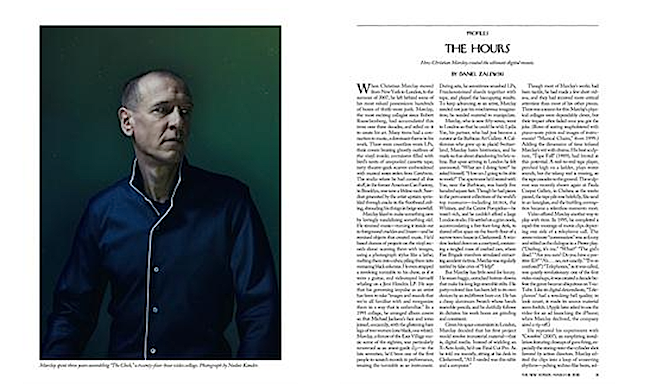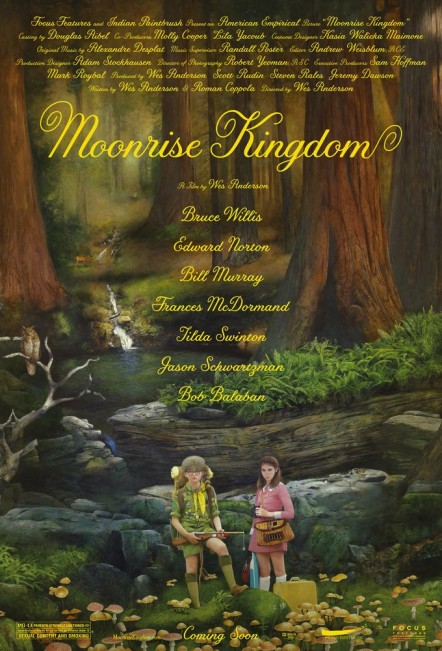Movie City Indie Archive for March, 2012
Collaging Every Zoom In THE SHINING (1’41”)
Interesting… at least conceptually.
A New Wes Anderson Commercial “Made Of Imagination”
Scored by Jónsi from sigur rós.
Talking Technique With Tony Kaye (6 vids)
Kaye’s Detachment opened recently, with Adrien Brody as a high school teacher in conflict with his students. These short, swell interviews are by Armen Antranikian. Kaye’s concentration is focused by learned means of suppressing a stammer: I like listening to this guy.
“The one thing great about TV commercials is that you’re working all the time, and you can experiment. It was written somewhere that I would shot more footage for a 30-second commercial than Woody Allen would shoot for an entire film.”
“I enjoyed, and still do, enjoy the process of advertising things. Selling things. Telling these little short stories. But yet when I was doing it, I was aware, painfully aware, that the format of making a commercial is nothing like the format of making a long-form movie, but I was grabbing all the technical information that I could.”
Kaye on working/shooting for 25 years, 250-300 days a year. “The camera is a character in the scene… I never interrupt.”
Harmony Korine And Florida? What Could Go Right!
 Harmony Korine, Selena Gomez, Vanessa Hudgens, teenagers, Florida, robberies? Here comes Springbreakers. http://springbreakersfilm.tumblr.com/
Harmony Korine, Selena Gomez, Vanessa Hudgens, teenagers, Florida, robberies? Here comes Springbreakers. http://springbreakersfilm.tumblr.com/
Robert Altman’s 1st Film? MODERN FOOTBALL (26’21”)
“Robert Altman’s first film, according to IMDB. Transferred from a 16mm print discovered at a Kansas City swap & shop. Altman himself can be glimpsed at 2:37, in a cameo as a sports announcer.” [Via OpenCulture.]
Lena Dunham’s 2007 Series, “Tight Shots” (9’59”)
[Via Nerve. Subscribe at YouTube page for more instalments.]
“‘DEADWOOD’s Favorite Word” (7’55”)
Language, perhaps, NSFW. [Via Coilhouse.]
RIP Moebius
A 1973 self-portrait. [Via Jorge Colombo.]
1 Comment »Review: ATTENBERG
 Athina Rachel Tsangari‘s ATTENBERG is one of my favorite films of the past couple of years, and I wrote about it from Sundance in January 2011. Part of that review: “The eccentric activities shared by an architect father and still-unformed daughter in her early twenties, at the end of his life and a century shaped by his work in the small Greek village they live in, knit the disparate elements of Tsangari’s film together. They’re closest when they’re imitating the documentaries of David Attenborough (who provides the title and has the first thank-you in the end credits). Marina hasn’t discovered kissing yet, at least not until a goofy and discomfiting opening scene of rampagingly clumsy face-suck, let alone sex and love. (There is a wealth of awkwardness to come.) “You’re a sea urchin, you won’t let anyone touch you,” Bella tells her.
Athina Rachel Tsangari‘s ATTENBERG is one of my favorite films of the past couple of years, and I wrote about it from Sundance in January 2011. Part of that review: “The eccentric activities shared by an architect father and still-unformed daughter in her early twenties, at the end of his life and a century shaped by his work in the small Greek village they live in, knit the disparate elements of Tsangari’s film together. They’re closest when they’re imitating the documentaries of David Attenborough (who provides the title and has the first thank-you in the end credits). Marina hasn’t discovered kissing yet, at least not until a goofy and discomfiting opening scene of rampagingly clumsy face-suck, let alone sex and love. (There is a wealth of awkwardness to come.) “You’re a sea urchin, you won’t let anyone touch you,” Bella tells her.
Other strengths include extremely specific, heightened sound design, as well as a song score that includes work by Suicide, even though 23-year-old Marina is told, “you’re too young to like Suicide.” (Double-entendre present and accounted for.) A scene of deathbed mourning, accompanied by that band’s song “BeBop Kid,” is stark, simple, and surprisingly emotional. It’s a sustained take with strong horizontal elements, hospital room dim, shadows of brown, almost black, and the music plays, a character dances. Pow. Death, meet Suicide. The asperity of Alan Vega‘s spare post-punk pop matches the calculated austerity of Tsangari’s pictorial style.
While ATTENBERG is more gestural than dialogue-driven, the father has a speech about the failure of modern Greece that is as piercing and pungent as anything you hear on the streets of that country in its current economic straits. The father speaks of the now-barren factory town, the film’s setting, that he had helped design, of “the piston” and the sea, of industry and alienation. He describes Greece as a country that missed the industrial revolution, a populace that went from being shepherds to being petit-bourgeois strivers. It’s the rare scene that punches for the nose rather than lovingly constructed uncertainty. But the punch lands, forcefully.”
Profiling Christian Marclay
Daniel Zalewski‘s profile of Christian Marclay, maker of The Clock, in the March 12 New Yorker, isn’t on line, but it’s one of the best reads of the month. Across twelve-and-a-half pages, Zalewski pores over the pre-digital artwork of the 57-year-old artist, and also describes the stages of his process that led to the 24-hour museum sensation. In the 1990s, Marclay may have been one of the first DJs to employ scratching, and his roots as a sound artist emerge both in the attentive remix of soundtracks in The Clock as well as other pursuits. Here’s a taste of Zalewski’s prose, as he describes a collaboration Marclay had in late November in New York at a turntable performance by Tokyo sound artist Otomo Yoshihide. “Wearing a blue sweatshirt, he ran his fingers over the phonograph stylus, as if he were playing the piano, lending percussive flair to the LP that he’d chosen—a string-heavy soundtrack. Then he fondled the needle, the sensual gesture creating an awful hissing sound. He played a jazz record covered with a masking-tape “X.” Then he tried out several new moves: he crumpled a paper record sleeve into a ball and tossed in onto the whirring vinyl, where it careered into the stylus like a bumper car. He slapped records against the side of the turntable, creating an earthquakey rumble. He and Otomo barely looked at each other, but by listening carefully they built a solid structure—interludes of call and response, a moment of peak intensity, a controlled fade to silence. As with The Clock, Marclay was making a big gesture from a series of small ones.” [The New Yorker, March 12, 2012.]
Demo’ing The CHILDREN OF PARADISE 4K Restoration (4’17”)
“A demonstration of Pathé’s 4K digital restoration of Marcel Carné’s 1945 masterpiece CHILDREN OF PARADISE, playing in theaters this spring courtesy Janus Films.”
IRANIAN CINEMA UNDER SIEGE (2’50”)
From the YouTube summary: “The International Campaign for Human Rights in Iran has released a short video highlighting the plight of Iranian cinema. The video, “Iranian Cinema Under Siege” features Richard Peña, the director of the New York Film Festival, and Hamid Dabashi, professor at Columbia University, who discuss the extent of the government’s repression of Iranian filmmakers. Footage of prominent Iranian filmmakers Bahman Farmanara and Jafar Panahi, who is currently under house arrest, details the ongoing effect of this repression. The recent Academy Award for the Iranian film “A Separation” has once again put Iranian cinema in the spotlight for its original and innovative storytelling and reflection of daily societal issues. This international acclaim comes at the same time as the Iranian government continues its increased targeting and persecution of Iranian actors and filmmakers. Members of Iran’s independent film industry face enormous pressure from the government simply for pursuing their career. The Iranian government sees independent filmmakers who stray from the official narrative and strive for an honest portrayal of Iranian society as a threat. Right now, as the world is once again noticing Iranian cinema, this video calls attention to the situation inside Iran. The video calls for the Iranian government to let filmmakers and artists continue their work without the interference of authorities that see the film industry as an extension of their propaganda machinery, something many Iranian artists refuse to be.”














